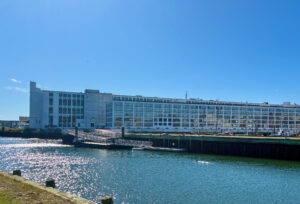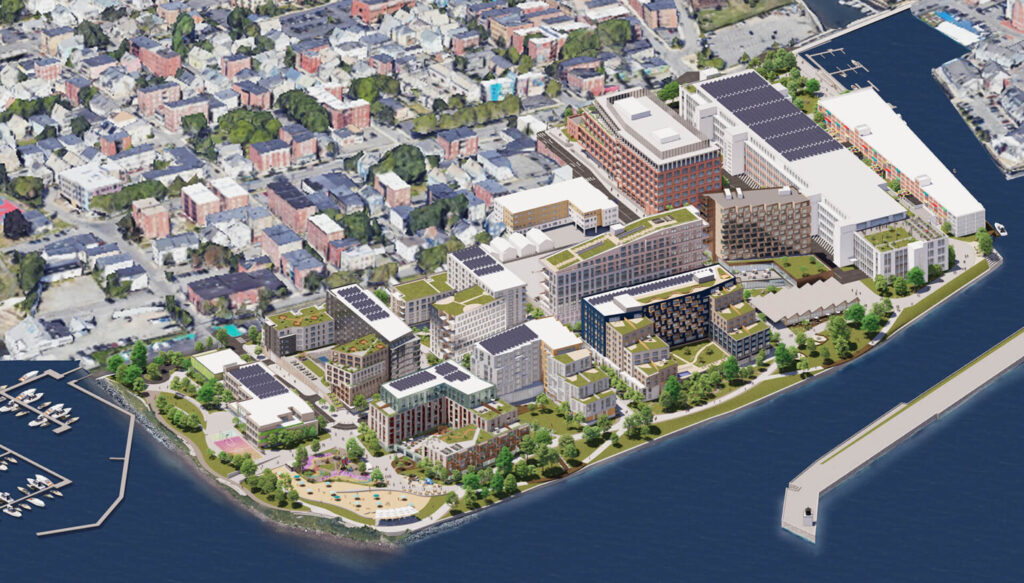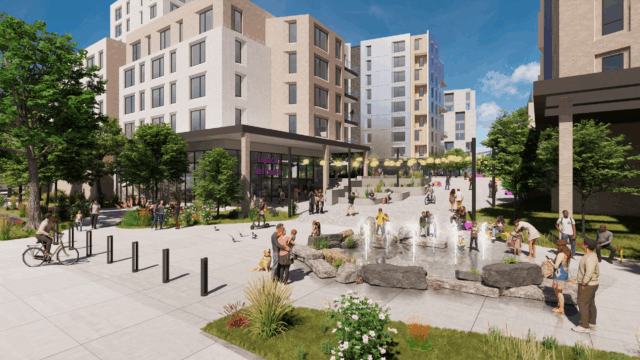
Affordable office and storage space on Salem’s waterfront could be replaced with thousands of apartments under a master plan by a New York developer. Photo by Steve Adams | Banker & Tradesman Staff
What responsibility does a developer have to deter housing displacement and gentrification outside of its property lines?
It’s a key question for Salem officials as they consider the largest project in the city’s nearly 400-year history: 1,200 apartments, a 200-room hotel and 1 million square feet of commercial space on nearly 30 acres of waterfront real estate steps from the Witch City’s famed tourist attractions.
Prime Group, a Saratoga Springs, New York-based real estate company, has floated plans for a wholesale reinvention of the property, demolishing two massive commercial buildings to make way for multifamily housing, the hotel and modernized workplaces.
Salem Mayor Dominick Pangallo said the city wants a significant affordable housing component included in the project. Shetland Park is located at the gateway to The Point, a densely settled enclave that has Salem’s lowest rents and property values.
“This is probably the most substantial project we would see in our lifetimes,” Pangallo said. “We think it’s so important to get things right.”
Affordability the Top Issue
The percentage of affordable units and household income qualification levels in the Shetland Park project lies at the heart of the discussions. Critics fear that luxury waterfront apartments will draw an influx of new residents, with ripple effects driving up rents in the surrounding area.
A 2024 MassInc study concluded that only 9 percent of Salem’s existing apartment stock qualifies as “naturally occurring affordable housing,” which is defined as unsubsidized units that are affordable to households earning under 50 percent of the state median income. Salem’s percentage was the fifth lowest of Massachusetts’ 26 Gateway Cities.
Many of the affordable apartments are located in The Point. Apartments in the neighborhood currently rent for $1,800 to $2,500, estimated Jeff Cohen, Salem’s Ward 5 City Councilor, who owns and occupies an apartment house in the neighborhood.
“It’s literally the most attractive property in Salem,” Cohen said of Shetland Park. “I’m all in support of redeveloping to add residential units, especially affordable housing. But there is a lot of resistance to the project itself.”

A rendering shows the full extent of Prime Group’s proposed redevelopment of its Shetland Park property in Salem. The plans only retain two of its existing buildings, at the far right of the image, plus a small portion of its expansive, low-rise segment. Image courtesy of Arrowstreet and Copley Wolff Design Group
Smart Growth District on the Table
Salem City Councilors have significant leverage to ask Prime Group for what they perceive as a better deal, Cohen noted. Prime Group needs council approval of a zoning change to allow the housing and hotel.
City officials and Prime Group have discussed creation of a Chapter 40R district. The “Smart Growth” state law gives payments of $3,000 per approved unit to communities that create multifamily zoning districts near public transit or walkable areas.
In presentations to city officials and community groups, executives have offered to exceed the minimum affordability requirements in Salem’s inclusionary zoning ordinance. They’ve also outlined community benefits ranging from an elevated flood barrier reflecting projected sea level rise to inclusion of a public waterfront park and pavilion.
Specifically, Prime Group offered to set aside 20 percent of the apartments, or 240 units, as income-restricted: 10 percent for households earning a maximum 80 percent of area median income, and 10 percent for those earning no more than 60 percent of AMI. The offer exceeds Salem’s inclusionary zoning ordinance, which requires 10 percent of units to be restricted for households earning 60 percent of AMI, with the remainder market-rate.
But the offer didn’t satisfy several city councilors following a July presentation by Prime Group CEO Robert Moser.
Echoing the calls for deeper affordability, Pangallo noted that Salem’s affordability and income guidelines are grouped with Greater Boston, and don’t reflect the local housing market.
“Our income levels as a Gateway City are substantially different than Boston or Somerville or Cambridge,” Pangallo said. “Even projects [reserved at] 60 percent AMI are not really creating housing for people who live in that neighborhood right now.”
Prime Group Holdings Chief of Staff Jurgen Bach said the company is in “active discussions with the city” on the affordability topic. The scale of the Shetland Park project would increase supply, and “additional housing would significantly improve the housing market for the neighborhood and overall,” he said.
Prime Group also has been canvassing the Point neighborhood and surveying residents on their priorities, which include options to find jobs closer to their homes, said Greg Lane, a public affairs advisor at Next Generation Strategies that is working with the developers.

New York developer Prime Group wants to redevelop more than half its Shetland Park commercial property into high-end housing with a significant affordable housing component. Image courtesy of Arrowstreet and Copley Wolff Design Group
Prime Group executives also promised to give current commercial tenants priority to lease space in the new development, and to work with the city on transportation management such as private shuttles to public transit stops.
“Housing in the right places can contribute to transportation solutions when it’s close to where people work or public transportation, but it is an area that is a bit isolated, and not aligned with the people who live in the neighborhood,” Pangallo said in an interview.
The council’s discussion has been put on hold for several months, while city officials await the submission of a “community preservation study” by Prime Group, including displacement effects on residents and commercial tenants.
Councilor Questions Track Record
A textile mill occupied the Congress Street property until its destruction in the Great Fire of 1914. It was later replaced by two large commercial buildings totaling 1.5 million square feet of office, flex and storage space. Entrepreneur and Jewish philanthropist Robert Lappen owned the complex from the 1950s until selling it in 2019 for $70 million, less than a year before his death. Enter Prime Group, a private real estate developer whose $10 billion portfolio includes self-storage facilities, RV parks and manufactured housing.
In recent years, North Shore nonprofits seeking affordable office space have made the complex home, including Disability Resource Center, culinary arts school ROOT and domestic violence support group HAWC.
Cohen convened a meeting of nonprofit tenants this year to discuss their experiences under Prime Group ownership. Some told of 30 percent rent increases, and a slow response to maintenance requests such as an elevator repair that was a critical priority for the disability center, he said.
“One of the problems I perceive is good faith,” Cohen said. “We want the best landlord, neighbor and developer possible. What guarantee do we have that if you get this ability to move forward, you won’t be the same kind of landlord you’ve been?”
A message was left with Prime Group seeking comment on the rent and maintenance issues.
Judgment on Prime Group’s promises and commitments now passes to a new City Council. On Tuesday, Salem voters elected six new members to the 11-member body, while Pangallo was elected to his first four-year term as mayor in an unopposed race.
The next step is Prime Group’s submission of the report on potential displacement to city officials, followed by a potential approval of a 40R district by the City Council and its submission by the mayor’s office to the state Executive Office of Housing and Livable Communities.





